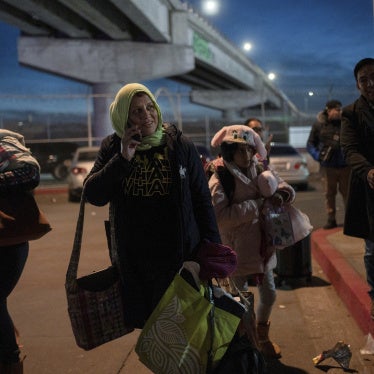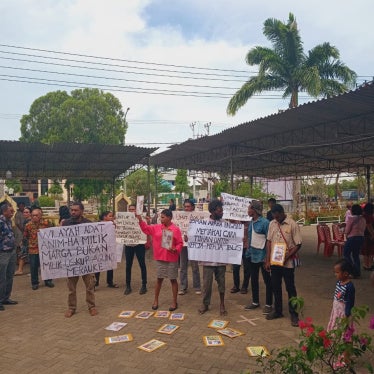The Honorable Colin Powell
Secretary of State
U.S. Department of State
2201 C Street, N.W., 7th Floor
Washington, D.C. 20520
Dear Secretary Powell:
We write to congratulate the U.S. State Department on the release of its second annual Trafficking in Persons Report (Trafficking Report) and to share some of our concerns about its content. Human Rights Watch considers the Trafficking Report a potentially powerful tool to address trafficking worldwide. However, several shortcomings undermine its impact.
As you are well aware, trafficking is a widespread human rights violation that threatens the lives, health, dignity, and security of millions of people throughout the world, with women and children suffering the brunt of the abuses. Trafficking is almost universally condemned, yet despite the formal commitment of many governments to combat the problem, many countries have taken insufficient measures to ensure the greatest protection for the human rights of trafficking victims.
Human Rights Watch has for many years documented and monitored trafficking in persons and advocated for greater accountability of traffickers. We have investigated trafficking of women and girls from Bangladesh to Pakistan, from Burma to Thailand, from Nepal to India, from Thailand to Japan, and from Eastern Europe to Bosnia and Herzegovina.
Based on our experience, we would like to raise the following concerns with the Trafficking Report that we hope will be corrected next year:
- The Trafficking Report does not adequately evaluate anti-trafficking measures. The Trafficking Report cites "actions" taken by governments to combat trafficking, such as setting up victim service programs, establishing inter-ministerial working groups, and proposing draft legislation, but does not evaluate the content or effectiveness of such measures. For example, the chapter on Costa Rica notes that minimal legal services are provided to victims, but does not assess the quality of the services or point out that foreign trafficking victims are deported without the benefit of those services. The chapter on Pakistan reports that the government established an inter-agency task force to combat trafficking in persons, but does not evaluate the results of the task force's work. The chapter on Nigeria mentions its draft federal trafficking legislation, but does not evaluate its shortcomings, such as the weak provisions on witness protection and victim services. Mentioning such measures without evaluating them gives credit where it may not be due. The Trafficking Report should set forth qualitative information: Are the victim service programs appropriately designed and funded, and are they effectively assisting victims in practice? What are the inter-ministerial task forces mandated to do, and have they succeeded? Does draft legislation cover trafficking into all forms of forced labor and provide adequate victim services and witness protections?
- The Trafficking Report is almost devoid of statistics. Crucial statistical data are almost entirely missing from the Trafficking Report. Two notable exceptions are the Albania and Moldova chapters, which provide basic data on the numbers of trafficking arrests, prosecutions, and convictions. In order to understand the scope and nature of the trafficking problems in the countries covered by the Trafficking Report, disaggregated statistics (victims' gender, age, and nationality, and the type of forced labor they endure), to the extent available, should be provided on the victims, as well as on prosecutions for trafficking-related offenses (arrests, conviction rates, and sentencing). Where such information is not available, the Trafficking Report should note governments' failure to compile and publish disaggregated statistics and urge them to do so.
- The Trafficking Report lacks specificity. The Trafficking Report is cursory in important areas, weakening its overall effect. For example, the Trafficking Report often notes that state authorities are corrupt or complicit in trafficking without explaining which authorities are involved, what role they play in the trafficking, and what corrective actions have been taken. A case in point is Burma: The Trafficking Report notes that Burma has not made efforts to address widespread corruption, but does not describe which corrupt agencies or officials are involved in trafficking. More concrete information is needed for the Trafficking Report to be effective at every level in the campaign against trafficking. At a minimum, the Trafficking Report should specify whether a country's legislation penalizes trafficking into all forms of forced labor (not just forced prostitution); which types of government agents are complicit in trafficking, and what measures have been taken to investigate and prosecute them; whether the country is failing to vigorously investigate and prosecute trafficking offenses, and what appears to be the reason for such failure; whether the country has effective government-funded witness protection and victim services programs, and whether all trafficking victims have access to those programs; and whether the country is a party to the U.N. Protocol to Prevent, Suppress and Punish Trafficking in Persons, Especially Women and Children (the Trafficking Protocol).
- The Trafficking Report fails to explain Tier movement. The Trafficking Report should describe the justification for moving countries from one Tier to another (within the three-level "Tier" scheme devised for the Trafficking Report). Failing to do this jeopardizes the credibility of the Tier system. For example, the Trafficking Report does not explain why Pakistan was moved from Tier 3 last year to Tier 2 this year. We believe the decision was inappropriate, given that Pakistan has not signed the Trafficking Protocol, has no national legislation criminalizing all forms of trafficking, and provides little in the way of victim services. The Department of State may have evidence that Pakistan has improved its performance since last year, but by failing to specify the grounds for moving Pakistan from Tier 3 to Tier 2, it has fueled concerns that Pakistan's inclusion in Tier 2 is a reward for its role in the war against terrorism. Clarifying the rationale behind Tier movement is critically important since those countries that appear in Tier 3 next year may be subject to non-humanitarian and non-trade-related aid sanctions.
The State Department's Trafficking Report is an important document for assessing other states' anti-trafficking measures and for recommending change, but it must be improved. To protect the millions of actual and potential trafficking victims around the world, we ask that you take a critical look at the Trafficking Report and ensure that all future reports evaluate the effectiveness of anti-trafficking efforts, include disaggregated statistics on trafficking victims and prosecutions, provide more specificity on issues such as corruption, prosecutions, and service programs, and explain the reasons for moving countries from one Tier to another.
We thank you for your attention to the concerns raised in this letter and look forward to being in contact.
Sincerely,
LaShawn R. Jefferson
Executive Director
Women's Rights Division
Cc: Ambassador Nancy Ely-Raphel, Senior Advisor to the Secretary, Office to Monitor and Combat Trafficking in Persons
April W. Palmerlee, Senior Coordinator, International Women's Issues








